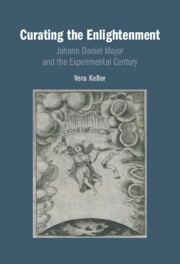Book contents
- Curating the Enlightenment
- Curating the Enlightenment
- Copyright page
- Dedication
- Contents
- Figures
- Acknowledgments
- Part I Introduction
- Part II Approaches to Knowledge
- Part III Reworking Disciplines
- Part IV Spaces of Knowledge
- Part V Conclusion
- 10 The Light of Nature and the Uses of Knowledge
- Bibliography
- Index
10 - The Light of Nature and the Uses of Knowledge
from Part V - Conclusion
Published online by Cambridge University Press: 07 December 2024
- Curating the Enlightenment
- Curating the Enlightenment
- Copyright page
- Dedication
- Contents
- Figures
- Acknowledgments
- Part I Introduction
- Part II Approaches to Knowledge
- Part III Reworking Disciplines
- Part IV Spaces of Knowledge
- Part V Conclusion
- 10 The Light of Nature and the Uses of Knowledge
- Bibliography
- Index
Summary
By arguing for an earlier development of the research university, this book questions previous accounts that have seen the state or the corporation as the main drivers of the making of research. Whereas other accounts see a turn toward useful knowledge as a corrective to the overly bookish or pedantic knowledge of professors, academics themselves reformed scholarly approaches both in opposition to their academic forebears and to the entanglement of knowledge with use. Both theory and practice could be a bias. This book highlights the research university as a place to cultivate and protect critical thinking from political and economic pressure. Even proponents of useful knowledge adopted academic techniques because by improving the quality of knowledge they made it more useful. The early modern development of dynamic epistemic superstructures suggests approaches to interdisciplinarity and continuing knowledge change today. The book encourages academics to participate in knowledge reforms from a position of epistemic humility and a self-critical search for biases. It proposes how curation of knowledge still represents a viable approach, but one that could be reformulated to address the biases of the past.
Keywords
- Type
- Chapter
- Information
- Curating the EnlightenmentJohann Daniel Major and the Experimental Century, pp. 337 - 350Publisher: Cambridge University PressPrint publication year: 2024

